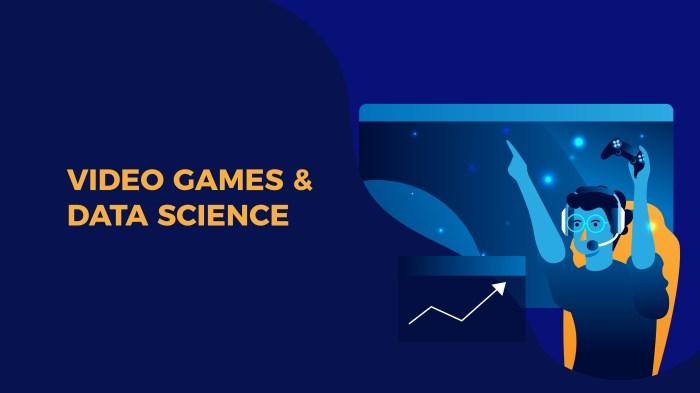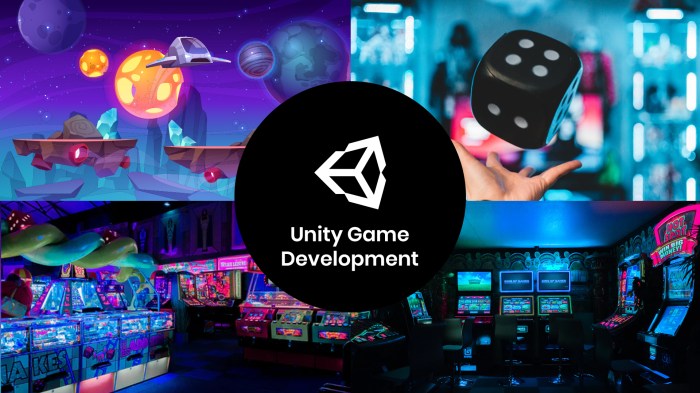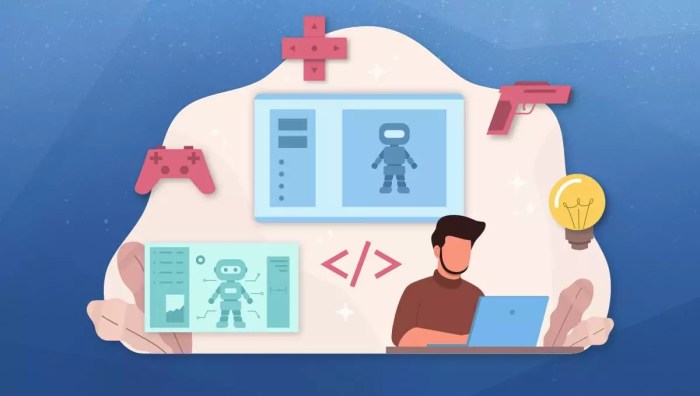Best Programming Languages Game Development
Best programming languages game development is a crucial aspect of modern game creation. Different languages excel in various facets of game design, from intricate visuals to seamless gameplay. This exploration delves into the strengths and weaknesses of popular languages, guiding developers through the process of selecting the ideal tools for their projects. Understanding the nuances of each language allows for informed decisions, optimizing performance and facilitating the creation of engaging experiences.
This comprehensive guide examines the diverse landscape of programming languages used in game development. We’ll cover popular choices like C++, Java, and Python, as well as emerging trends and technologies. Factors like performance, community support, and platform compatibility will be analyzed. A detailed look at successful game projects using specific languages will also provide valuable insights into real-world applications.
Ultimately, this exploration aims to empower developers with the knowledge needed to make informed decisions regarding their language choices.
Introduction to Game Development Languages
Game development relies heavily on programming languages to bring interactive worlds and engaging experiences to life. Different languages excel in different aspects of game creation, influencing the speed of development, performance, and the overall feel of the game. Understanding the strengths and weaknesses of each language is crucial for selecting the right tool for the job. This section will delve into popular game development languages and their applications within the industry.
Popular Game Development Languages
Various programming languages are used in game development, each with its own strengths and weaknesses. Understanding these differences is key to choosing the best language for a specific project.
- C++: C++ is a widely used language known for its performance and control over hardware resources. Its low-level access enables intricate game mechanics and demanding graphics. C++’s flexibility and efficiency make it a popular choice for AAA titles and complex simulations. However, its steeper learning curve and intricate syntax can make it challenging for beginners.
Its rich ecosystem and extensive libraries provide a wide array of tools and frameworks. Notable examples of games developed using C++ include the popular “Grand Theft Auto” series, “The Witcher 3,” and “Crysis.”
- C#: C# is a powerful language that is part of the .NET framework. It’s known for its strong typing and robust ecosystem, making it well-suited for creating games within a structured environment. Unity, a widely popular game engine, uses C# extensively. The language’s focus on object-oriented programming (OOP) principles simplifies the development process. However, C#’s performance can sometimes lag behind languages like C++ for demanding games requiring high frame rates.
Games built using Unity, such as “Stardew Valley,” and “RimWorld,” leverage C# effectively.
- JavaScript: JavaScript, primarily used for web development, is also increasingly popular for game development, particularly for browser-based games and prototypes. Its ease of use and cross-platform compatibility make it suitable for smaller projects and rapid development. However, its performance can be a limitation compared to C++ or C#. Tools like Phaser and Pixi.js facilitate game creation in JavaScript.
Many browser-based games, including casual titles and prototypes, are created using JavaScript.
- Python: Python is a high-level language renowned for its readability and ease of learning. It’s a good option for prototyping and smaller games, where speed of development is crucial. Its extensive libraries like Pygame allow for the creation of games without extensive code. However, Python’s performance might not match C++ or C# for large-scale, complex games.
Its ease of use and readability are well-suited for rapid prototyping and smaller games. “Godot Engine” utilizes Python for scripting, enabling game development using Python.
Language Comparison Table, Best programming languages game development
The table below compares the discussed languages based on key characteristics relevant to game development.
| Language | Performance | Ease of Learning | Community Support | Typical Use Cases |
|---|---|---|---|---|
| C++ | High | Medium-High | Excellent | AAA titles, complex simulations, high-performance games |
| C# | Medium | Medium | Excellent | Unity-based games, medium-complexity games |
| JavaScript | Medium-Low | Low | Excellent | Browser-based games, prototypes, smaller projects |
| Python | Low | Low | Good | Prototypes, smaller games, rapid development |
Popular Languages for Game Development
Choosing the right programming language is crucial for game development, impacting everything from development speed to game performance. Different languages excel in different areas, offering various strengths and weaknesses. This section explores the top contenders in the game development arena.
Top 5-7 Popular Languages
Several languages consistently dominate the game development landscape due to their performance, community support, and suitability for specific game types. These languages provide developers with robust tools and resources, fostering efficiency and innovation.
- C++: C++ remains a powerhouse in game development, particularly for demanding titles. Its performance is unmatched, allowing for intricate game mechanics and high frame rates. The language’s low-level access to hardware translates to efficient resource utilization. Its extensive libraries and large community support provide ample resources for developers. C++ is often chosen for AAA titles, simulations, and games requiring high-end graphics.
- C#: C# is a popular choice for game development due to its object-oriented nature, which promotes code organization and maintainability. Unity, a widely used game engine, predominantly utilizes C#. The language’s integration with Unity simplifies development and accelerates the creation process. C# is often seen in games with complex systems or large-scale development teams.
- Java: Java, known for its platform independence, finds applications in game development, especially for mobile and cross-platform games. The language’s robust frameworks and extensive libraries provide significant support for developing games across various platforms. Java’s reliability and efficiency make it a solid option for mid-sized projects.
- JavaScript: JavaScript, primarily used for web development, has expanded its role in game development. Game engines like Phaser and PixiJS leverage JavaScript for creating browser-based games. Its flexibility and cross-platform compatibility are key advantages. JavaScript-based games often target web browsers or mobile devices with limited hardware requirements.
- Python: Python’s versatility and readability make it a favorite for prototyping and smaller game projects. Its extensive libraries, including Pygame, offer easy access to graphics and sound functions. The language’s simplicity speeds up development cycles, making it well-suited for educational games and indie titles. Python’s ease of use makes it a popular choice for those new to game development.
- Lua: Lua is frequently employed as a scripting language alongside other languages, such as C++. Its lightweight nature and speed make it ideal for adding dynamic features and logic to existing games. This integration is often seen in complex games, especially those with intricate systems and AI components.
Typical Game Genres for Each Language
The choice of language can significantly impact the type of game a developer creates. This table illustrates the typical game genres commonly associated with each language, highlighting their suitability for specific types of gameplay.
| Language | Typical Game Genres |
|---|---|
| C++ | Action-RPGs, Simulations, Real-time Strategy (RTS), AAA titles, MMORPGs |
| C# | Action-adventure games, puzzle games, strategy games, developed using Unity Engine |
| Java | Mobile games, cross-platform games, simulations, educational games |
| JavaScript | Web-based games, casual games, browser-based strategy games |
| Python | Prototypes, indie games, educational games, smaller projects, simulations |
| Lua | Complex game systems, AI integration, dynamic features, integration with other languages |
Emerging Trends in Game Development Languages
The landscape of game development is constantly evolving, with new languages and technologies emerging to meet the demands of increasingly complex and sophisticated games. This shift allows developers to create innovative experiences while optimizing performance and efficiency. This section will explore some of the rising stars in the game development sphere.The rise of specific languages and frameworks isn’t solely based on their novelty, but on practical advantages.
These advancements often address specific challenges or offer unique capabilities, which can streamline development processes, leading to faster turnaround times and potentially lower costs. These emerging technologies are not mere trends, but often reflect fundamental changes in how games are designed and built.
Languages Gaining Traction
Several languages and frameworks are gaining traction in the game development sector. These choices often depend on the project’s specific requirements, such as the desired game genre, the target platform, and the developer’s familiarity and expertise.
- Rust: Known for its performance and memory safety, Rust is gaining popularity for game development, particularly for demanding projects that require high levels of control and reliability. Its strong typing system and ownership model contribute to preventing common errors. Rust’s ability to manage memory effectively reduces the risk of crashes and improves performance. This translates into smoother gameplay and more stable applications.
- C# with Unity: Unity’s widespread adoption, coupled with the versatility of C#, continues to drive its usage in game development. The integrated development environment (IDE) and extensive community support make it a practical choice for many projects. C# with Unity offers a robust ecosystem for creating 2D and 3D games across various platforms, from mobile to PC. The platform’s visual scripting capabilities further reduce development time and improve efficiency.
- Godot Engine with GDScript: Godot Engine, an open-source game engine, is increasingly favored for its ease of use and versatility. GDScript, a high-level scripting language integrated into the engine, allows developers to create games quickly and efficiently. Its ability to create visually appealing games, with less complexity, makes it an attractive option for indie developers and smaller studios.
Evaluating Emerging Languages
This section provides a table to compare the potential advantages and disadvantages of some of the newer game development languages.
| Language/Framework | Potential Advantages | Potential Disadvantages |
|---|---|---|
| Rust | High performance, memory safety, low-level control, excellent for demanding games | Steeper learning curve, smaller community compared to established languages |
| C# with Unity | Mature ecosystem, large community support, ease of use for 2D and 3D games, robust visual scripting | Potential performance limitations for extremely demanding games, dependence on Unity engine |
| Godot Engine with GDScript | Open-source, cost-effective, easy to learn, suitable for rapid prototyping, excellent for smaller projects | Performance may not match some commercial engines, documentation may not be as extensive as some commercial engines |
Language Selection Considerations
Choosing the right programming language for a game development project is crucial. A poorly chosen language can significantly impact development time, cost, and the overall quality of the final product. Careful consideration of various factors, including project scope, team expertise, and performance requirements, is essential for a successful outcome. Understanding platform compatibility is also paramount, as different languages excel in different environments.
Project Scope and Complexity
Project scope directly influences language selection. Simple games might be suitable for scripting languages, allowing for rapid prototyping. However, complex titles requiring extensive features and sophisticated systems often necessitate languages with robust functionalities and performance capabilities. For example, a mobile puzzle game might benefit from a language like JavaScript or C#, whereas a high-fidelity, open-world game might leverage C++ for its performance advantages.
Team Expertise and Experience
The programming skills of the development team are a significant factor. A team proficient in C++ might find it more efficient to use that language, while a team with experience in JavaScript might prefer that language. Selecting a language familiar to the team accelerates development and minimizes training time, reducing project overhead. Language familiarity also directly impacts the team’s ability to effectively debug and maintain the codebase.
Performance Requirements
Performance is paramount in game development. Real-time rendering, physics simulations, and AI require high processing power. Languages known for their performance, such as C++, often lead to faster execution speeds and smoother gameplay. Languages like C# and Java, while not as performance-intensive as C++, still offer reasonable performance for many games, especially on more modern platforms. For example, high-end games often use C++ to achieve high frame rates, whereas simpler games can leverage other languages to meet their needs.
Platform Compatibility
Different platforms (mobile, PC, consoles) have varying requirements and capabilities. Mobile games often rely on languages like C# or Java, which can integrate with mobile development frameworks. PC games frequently utilize C++ for its flexibility and performance. Console games, depending on the specific console and its architecture, often employ languages like C++ due to its performance advantages and compatibility with the underlying hardware.
Understanding the platform’s architecture and limitations is critical when choosing a language.
Example Comparison: Mobile vs. PC
| Factor | Mobile | PC |
|---|---|---|
| Language | C#, Java, JavaScript (with frameworks) | C++, C#, JavaScript (with frameworks) |
| Performance | Usually less demanding, optimization important | Higher demands, optimization critical |
| Development Time | Can be faster for simpler games | Potentially longer, but can offer greater flexibility |
This table illustrates how different platforms influence language choices. Mobile games often favor languages optimized for mobile frameworks, while PC games often require languages that can meet the higher performance expectations.
Conclusion
Choosing the appropriate programming language for a game development project is not a simple task. A thoughtful evaluation of project scope, team expertise, performance needs, and platform compatibility is essential. The decision should be data-driven and tailored to the specific project requirements, ensuring a successful and efficient development process.
Performance and Efficiency in Game Development Languages

Source: pressablecdn.com
Game development often hinges on achieving optimal performance. Different programming languages possess varying strengths and weaknesses in terms of efficiency, impacting everything from frame rates to resource consumption. Understanding these nuances is crucial for crafting high-quality, responsive games.Languages chosen for game development must balance expressiveness with execution speed. Some languages excel at rapid prototyping and code readability, while others are optimized for raw processing power and minimal overhead.
This section will delve into the performance characteristics of various languages and strategies for optimizing code.
Impact of Language Choices on Performance
Different programming languages have varying performance characteristics, which can significantly affect game development. Languages like C++ are renowned for their speed and low-level control, making them a popular choice for core game logic and rendering. Conversely, languages like Python, while excellent for scripting and rapid prototyping, might not be as performant for computationally intensive tasks within a game.
Optimization Techniques for Different Languages
Optimizing code across various languages requires specific strategies. For example, in C++, optimizing for speed involves meticulous memory management and leveraging compiler flags for performance enhancements. Python code can be optimized through utilizing libraries designed for numerical computation, and careful use of data structures and algorithms to reduce unnecessary processing.
C++ Optimization Techniques
C++ code optimization involves several key techniques. Utilizing efficient data structures (like vectors and maps) instead of less optimized alternatives is essential. Careful memory management, avoiding memory leaks, and using appropriate allocation/deallocation strategies are also crucial. Compiling with optimization flags (e.g., -O2 or -O3) allows the compiler to perform aggressive optimizations to reduce execution time. Inlining functions, where appropriate, can further enhance performance.
Example: Replacing a loop with a vector operation can drastically improve performance.
“`C++// Inefficientfor (int i = 0; i < 1000; ++i) result += data[i]; // Efficient result = std::accumulate(data.begin(), data.end(), 0); ```
Python Optimization Techniques
Python, while often slower than C++, can be optimized through various strategies. Using NumPy for numerical computations, which is highly optimized for array operations, can boost performance significantly. Vectorization techniques, where possible, translate loops into optimized operations, which can dramatically improve execution time.
General Performance Optimization Strategies
Regardless of the language, common optimization strategies apply. Profiling tools can pinpoint performance bottlenecks, highlighting sections of code that consume excessive resources. Caching frequently accessed data to avoid redundant computations is another crucial technique. Algorithmic optimization, such as employing more efficient algorithms, can drastically reduce execution time.
Example: Profiling in Python
Python’s `cProfile` module allows for profiling code execution, revealing time spent in different parts of the program. This aids in identifying performance bottlenecks and guiding optimization efforts.
Example: Profiling can identify slow loops or functions, which can be targeted for optimization.
Community Support and Resources
A strong community is vital for any programmer, especially in game development. Active forums, comprehensive documentation, and readily available tutorials are crucial for learning and troubleshooting. This section details the community support available for popular game development languages.A thriving community fosters collaboration and knowledge sharing, accelerating the learning curve for developers. Dedicated resources like forums and tutorials are essential for overcoming challenges and expanding expertise.
Documentation Availability
Comprehensive documentation is essential for understanding the nuances of a programming language. Well-written documentation provides clear explanations of syntax, functions, and libraries, allowing developers to effectively utilize the language. High-quality documentation facilitates quicker learning and problem-solving.
- Many languages boast extensive online documentation, often in the form of official API references. These resources offer detailed explanations of every function, class, and method, enabling developers to grasp the intricacies of the language.
- Language-specific websites usually provide detailed documentation covering fundamental concepts, advanced features, and specific use cases, aiding developers in grasping the core principles and advanced implementations.
Tutorials and Learning Resources
Tutorials are invaluable for practical application of a language’s capabilities. They guide developers through step-by-step examples, progressively building their understanding and skills. These tutorials often demonstrate how to build projects or implement specific functionalities.
- Numerous online platforms and websites offer comprehensive tutorials catering to varying skill levels. These tutorials often cover game-specific implementations and techniques, offering a practical approach to mastering the language for game development.
- YouTube channels and dedicated learning platforms offer diverse video tutorials, often demonstrating the practical use of specific functionalities in game development. These resources can provide visually-oriented guidance and explanations, particularly helpful for visual learners.
Community Forums and Support
Active online forums provide invaluable avenues for developers to seek help, share solutions, and discuss best practices. These platforms offer opportunities to connect with experienced developers and learn from their expertise.
- Dedicated forums for game development languages allow developers to ask questions, share code snippets, and receive assistance from a community of fellow developers. These platforms often serve as crucial troubleshooting hubs.
- The availability of dedicated forums or community support channels plays a vital role in facilitating quick responses to queries and providing solutions to common challenges encountered during development.
Comparative Overview of Community Support
| Language | Documentation | Tutorials | Forums |
|---|---|---|---|
| C++ | Extensive, well-maintained | Abundant, diverse | Large, active |
| C# | Comprehensive, up-to-date | Numerous, practical | Large, supportive |
| Java | Thorough, well-organized | Extensive, beginner-friendly | Significant, active |
| JavaScript | Well-documented | Extensive, diverse | Very large, active |
| Python | Clear, concise | Growing, diverse | Large, helpful |
Illustrative Examples and Case Studies: Best Programming Languages Game Development
Real-world game development projects offer valuable insights into the strengths and weaknesses of different programming languages. Analyzing successful projects reveals how developers leverage specific languages to overcome challenges and achieve desired outcomes. This section presents examples of successful game development projects, highlighting the practical applications and nuances of chosen languages.
Examples of Successful Game Development Projects Using C++
C++ is a powerful and widely used language in game development, known for its performance and control over system resources. Its versatility allows for intricate game mechanics and complex simulations.
- Grand Theft Auto V (GTA V): This highly successful open-world action game utilized C++ for its core game engine and performance-critical components. The immense scale of GTA V required a language capable of handling a massive amount of data, physics calculations, and complex AI behaviors. C++’s low-level control allowed the developers to fine-tune performance and achieve high frame rates even in dense environments with numerous characters and objects.
The intricate physics simulations and responsive gameplay loop in GTA V were largely dependent on the efficient and optimized use of C++.
- Dota 2: This popular Multiplayer Online Battle Arena (MOBA) game leverages C++ for its core game engine, ensuring a consistent and smooth experience for millions of players worldwide. The real-time strategy and intricate decision-making in Dota 2 require a robust and reliable language, and C++ excels in providing that platform. The game’s performance is essential for an engaging and competitive multiplayer experience.
The use of C++ allows for rapid processing of player actions, minimizing latency and ensuring a seamless gameplay experience.
Examples of Successful Game Development Projects Using Java
Java’s platform independence and extensive libraries make it suitable for game development projects targeting diverse platforms. Its robust frameworks and object-oriented approach offer advantages in structuring complex game logic and functionalities.
- Minecraft: Although initially developed using Java, Minecraft is a prime example of a game that benefited from a robust and easily extendable framework. Java’s flexibility in handling a vast amount of data and code allowed the developers to rapidly expand the game’s features and community-driven content. The vast number of mods and extensions available for Minecraft is testament to the language’s flexibility and extensibility.
Examples of Successful Game Development Projects Using Unity and C#
Unity, a popular game engine, heavily relies on C#. Its integration with Unity’s vast asset store and ecosystem makes it a popular choice for developers targeting diverse platforms. The language facilitates quick prototyping and iteration, leading to faster development cycles.
- Fortnite: This popular battle royale game utilizes Unity and C# to facilitate rapid iteration and updates. C#’s integration with Unity’s engine allows for rapid prototyping and modification of game mechanics, enabling developers to quickly respond to player feedback and implement new features.
Challenges and Solutions in Project Implementation
Specific challenges often arise during game development, and developers address these using appropriate programming languages. For instance, optimization is crucial in real-time games. Utilizing the right language, like C++, can improve performance. In other cases, using Java or C# with game engines like Unity might prioritize development speed over raw performance.
Language Learning Paths

Source: potenzaglobalsolutions.com
Mastering a game development language requires a structured approach. Simply memorizing syntax isn’t enough; understanding the language’s nuances and its application within the game development workflow is crucial. Effective learning involves practical application, consistent practice, and a deep understanding of the language’s capabilities.Effective learning involves a multifaceted approach that balances theoretical understanding with practical application. This entails exploring different learning resources, engaging in hands-on exercises, and actively seeking support from the community.
This approach will provide a solid foundation and ensure a smoother transition into developing compelling games.
Different Approaches for Learning Game Development Languages
Various methods exist for acquiring programming language proficiency. Learning styles vary, and tailoring the approach to individual needs and preferences is vital. Some common strategies include interactive tutorials, coding challenges, and dedicated projects. Understanding these approaches allows learners to select the method that best suits their learning style and goals.
Recommended Resources for Beginners
Numerous online platforms and resources cater to beginners seeking to learn game development languages. These resources provide structured tutorials, interactive exercises, and opportunities to connect with other learners. Some highly regarded platforms include Codecademy, freeCodeCamp, and Udemy, offering comprehensive courses and tutorials on various game development languages. These platforms often feature interactive exercises and projects, reinforcing the theoretical knowledge with practical application.
Structured Learning Path for Each Language (Example: C++)
A structured learning path allows learners to progress systematically, building a solid foundation and gradually increasing complexity.
- Fundamentals: Start with basic syntax, data types, variables, operators, and control flow. Focus on understanding fundamental programming concepts like loops, conditional statements, and functions. Practice writing small programs to solidify these concepts.
- Object-Oriented Programming (OOP): Dive into OOP principles, including classes, objects, inheritance, polymorphism, and encapsulation. Implement simple game objects and classes. Understand how OOP principles are used to organize and structure game code.
- Game-Specific Concepts: Introduce core game development concepts like vectors, matrices, and graphics libraries. Explore how these concepts are used in game development and practice creating simple 2D game elements. This phase focuses on implementing game logic and mechanics.
- Project-Based Learning: Develop increasingly complex game projects, starting with simple prototypes and gradually adding features and functionalities. Implement features such as collision detection, movement, and user input. Focus on practical application and problem-solving in a game context.
- Advanced Topics: Explore more advanced topics, such as memory management, debugging techniques, and performance optimization. This will enhance the skills required for developing high-performance games.
Illustrative Examples and Case Studies
Real-world examples of game development projects can inspire learners and demonstrate the practical application of learned concepts. Games like “Tetris” or “Space Invaders” are excellent starting points for beginners. These projects showcase fundamental game mechanics and provide a clear path for applying learned skills. Furthermore, studying the architecture and code of popular games can reveal effective strategies for implementing various game features.
Summary

Source: sitepoint.com
In conclusion, the best programming language for game development hinges on specific project needs. From established favorites like C++ to rising stars, understanding the strengths and weaknesses of each is key. Careful consideration of factors such as performance, community support, and team expertise ultimately guides the selection process. The examples and case studies demonstrate the practical applications of various languages in successful game development projects.
Choosing the right language is a critical step in creating engaging and well-performing games. This guide has provided a solid foundation for developers to navigate the intricate world of game programming languages.













Post Comment